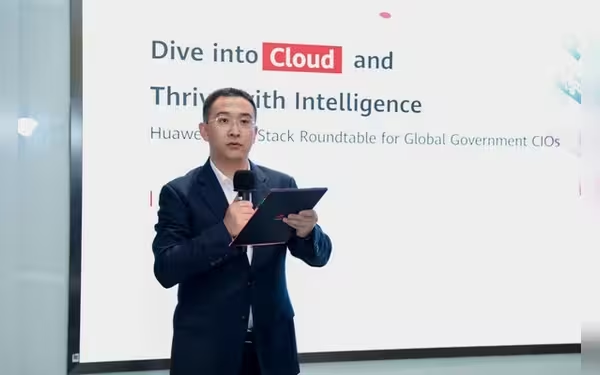Saturday, November 16, 2024 05:47 PM
Huawei Cloud Stack Empowers Global Governments for Digital Transformation
- Huawei Cloud supports over 800 government cloud projects globally.
- National government cloud architecture enhances security and efficiency.
- Countries like Thailand and Kenya benefit from Huawei's cloud initiatives.
 Image Credits: en_prnasisa
Image Credits: en_prnasisaHuawei Cloud Stack aids global governments in digital transformation, enhancing public services and driving economic growth.
In today's rapidly evolving digital landscape, governments around the world are increasingly recognizing the importance of cloud technology. The shift towards digitalization is not just a trend; it is a necessity for enhancing public services and driving economic growth. At the recent HUAWEI CONNECT 2024 event held in Shanghai, leaders from various countries gathered to discuss how cloud technology can help governments thrive in the digital age.
The roundtable, themed "Dive into Cloud and Thrive with Intelligence," brought together digital economy leaders from 20 countries across Asia Pacific, Africa, the Middle East, Central Asia, and Latin America. This gathering highlighted the global push towards digital transformation, with over 170 countries already implementing digital development strategies and more than 50 countries initiating artificial intelligence (AI) strategies.
Shang Haifeng, the CEO of Huawei Mainframe Modernization BU, emphasized the role of Huawei Cloud in this transformation. He stated, "Huawei Cloud is at the forefront of global digitalization. We have delivered more than 800 government cloud projects across more than 120 countries and regions." This commitment to supporting nations in their digital journeys is evident in Huawei's innovative technologies and solutions, which aim to enhance government services and improve efficiency.
Wind Li, Vice President of Huawei, echoed this sentiment, stating that diving into the cloud is not merely about technology; it is a crucial factor in innovating government service models. He noted that with the adoption of emerging technologies, public service experiences and government collaboration can be significantly improved, ultimately supporting sustainable economic and social development.
However, as many countries push for cloud-native adoption, challenges remain. Building secure, compliant, and efficient government clouds is essential for accelerating innovation. To address these challenges, Huawei Cloud Stack has introduced a national government cloud reference architecture that includes security clouds, government clouds, and public clouds.
Hu Hang, General Manager for International Business of Huawei Hybrid Cloud, explained that Huawei Cloud Stack provides a robust foundation for the Huawei National Cloud 2.0 solution. This includes over 120 essential cloud services and more than 40 scenario-specific solutions designed to help governments achieve their digital goals more swiftly.
In addition, Huawei has launched the Government Leap Program, which focuses on three major areas: scenario leap, migration leap, and industry leap. This program aims to create benchmarks for data governance, disaster recovery, and cloud security, while also offering free virtualization migration tools to facilitate the transition to Huawei Cloud Stack.
Countries like Thailand and Kenya are already reaping the benefits of these initiatives. The Thai government has partnered with Huawei to establish a national cloud data center, significantly improving service delivery and saving THB800 million in annual operational costs. Similarly, Kenya's Konza Smart City has collaborated with Huawei to create its first Tier-3 cloud data center, enabling the migration of over 70 core government applications.
As Huawei continues to invite global governments and enterprises to explore the potential of cloud technology through its "Leap2Cloud" initiative, it is clear that the future of public services lies in digital innovation. The recognition of pioneering government customers with the "Leap2Cloud Distinguished Government Innovation Pioneer Awards" further underscores the importance of collaboration in this journey.
The discussions at HUAWEI CONNECT 2024 serve as a reminder that embracing cloud technology is not just about keeping up with trends; it is about building a better future for governments and citizens alike. As nations continue to navigate the complexities of digital transformation, the insights shared at this event will undoubtedly play a crucial role in shaping the future of public services and economic development.













